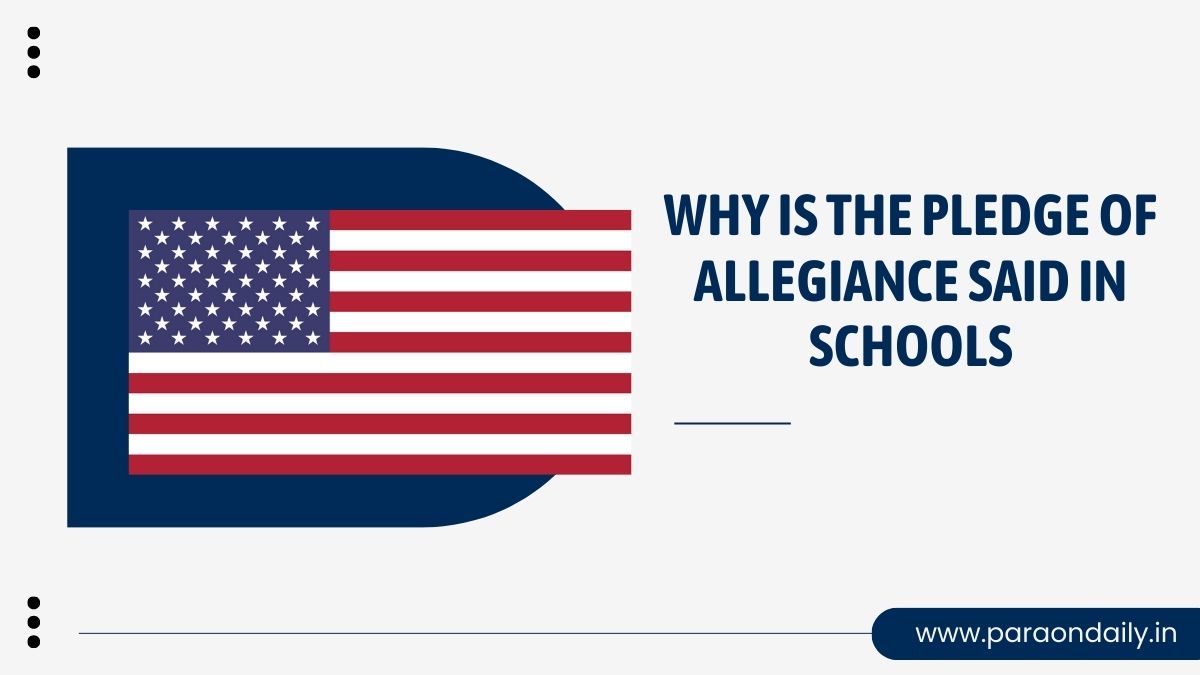Schools are places where children learn not only reading and writing but also values that shape them into responsible citizens. One common practice in many schools is the recitation of the Pledge of Allegiance. Many people often wonder why is the pledge of allegiance said in schools and what role it plays in the life of students. The pledge is more than just a group of words; it is a reminder of respect, unity, and commitment toward the nation.
In this blog, we will explore the reasons behind this practice and explain its importance in a very simple and formal way.
Understanding the Pledge of Allegiance
The Pledge of Allegiance is a short statement of loyalty to the flag and the nation. It is often recited at the start of the school day in classrooms across the United States. The words are meant to express unity, respect for the country, and belief in liberty and justice. Over the years, this tradition has become a way to bring students together and encourage national pride.
Also read: Why is Accreditation of Nursing Education Programs Important?
Historical Background of the Pledge
The Pledge of Allegiance was first written in 1892 by Francis Bellamy. It was introduced during the 400th anniversary of Christopher Columbus’s arrival in America. At that time, schools were asked to include the pledge as a part of celebrations to promote patriotism. Later, the pledge was officially recognized and became a daily practice in schools. It has gone through some changes in wording, but its purpose has always remained the same: to unite people under shared values of freedom and justice.
Why Is the Pledge of Allegiance Said in Schools?
1. To Promote National Unity
One of the main reasons why the pledge is recited in schools is to promote national unity. Students come from different backgrounds, cultures, and communities. Saying the same pledge together reminds them that they are all part of one nation. It helps in building a common identity and a sense of belonging.
2. To Teach Respect for the Nation
Reciting the pledge teaches students the value of respect. By standing together, placing a hand on the heart, and saying the words, children learn to honor the flag and the principles it represents. This respect carries forward into their adult lives, shaping them into responsible citizens.
3. To Encourage Discipline and Responsibility
The act of saying the pledge every day builds discipline among students. It sets the tone for the school day, teaching children that certain rituals are important and must be followed with seriousness. It also makes them understand their responsibility toward society and the nation.
4. To Remember Liberty and Justice
The pledge contains the words “with liberty and justice for all.” This is a powerful reminder of the core values of the United States. Reciting these words daily helps students understand that freedom and fairness are rights for everyone. It also encourages them to respect the rights of others.
5. To Create a Shared School Culture
Schools aim to create a culture of togetherness and cooperation. The pledge acts as a common practice that unites students and teachers. It provides a sense of routine and tradition, making students feel connected not only to their classmates but also to the larger community.
The Role of the Pledge in Civic Education
Apart from academics, schools also prepare students to become active and responsible citizens. Civic education is about understanding laws, rights, duties, and values of democracy. The pledge plays a part in this by reminding children of the principles their country stands for. It encourages them to think about fairness, equality, and justice, which are essential for building a healthy society.
Different Views About the Pledge
While the pledge is a long-standing tradition, there are also different opinions about it. Some people believe that it should not be mandatory because students should have the freedom to decide whether to participate. Others feel it is an important practice that helps in creating respect and unity. In many schools, students are allowed to choose whether or not to recite it, making the practice more inclusive.
The Pledge as a Symbol of Patriotism
Patriotism means love and devotion to one’s country. The pledge is a small but meaningful way for students to express this devotion. Even though young children may not fully understand every word, the daily habit builds a connection with their country. As they grow older, they begin to understand the deeper meaning behind the words.
Importance of Symbols in Education
The flag and the pledge are strong symbols of the nation. In education, symbols play an important role in teaching values without long lectures. For example, saluting the flag or singing the national anthem are symbolic acts that build pride and respect. Similarly, the pledge of allegiance is a symbol that quietly teaches unity, loyalty, and gratitude.
Is the Pledge Still Relevant Today?
Some may question whether the pledge is still important in modern times. The answer is yes, because its message of liberty, justice, and unity remains meaningful. In a world where people often focus on differences, the pledge reminds us of shared values. It continues to be a simple but powerful tradition in schools that shapes young minds positively.
How Teachers Can Explain the Pledge
Teachers play an important role in helping students understand the meaning of the pledge. Instead of just asking them to repeat the words, teachers can explain what liberty, justice, and allegiance mean in simple terms. This way, children will not only memorize the words but also learn the values behind them.
Also read: What is the Minimum Education Level Required?
Conclusion
The pledge of allegiance is more than just a morning routine in schools. It has deep meaning and an important purpose. It is said in schools to promote unity, respect, discipline, and love for the nation. When we ask why is the pledge of allegiance said in schools, the answer lies in its ability to remind students of the principles of liberty and justice. While there may be different opinions about its practice, the pledge continues to play a role in shaping responsible and respectful citizens. By reciting it together, students learn the values of respect, fairness, and unity, which are essential for building a strong and peaceful society.

